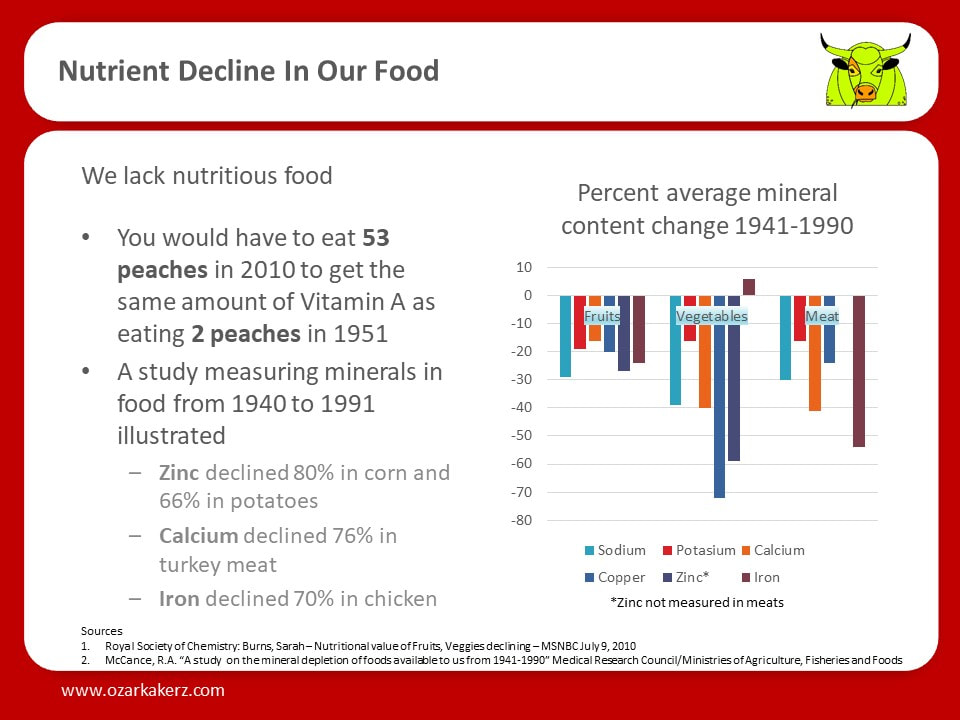"Farming in harmony with nature is as much about unlearning as it is about learning." - Farmer Mike
Farming in Harmony with Nature
Farming in Harmony with Nature
Farming in nature gives you two choices, farm with nature or farm against it. Our choice is to farm with it. This means many things to us including but not limited to:
- Listening to and humbly learning about plants from our local indigenous communities
- Not spraying herbicides or pesticides
- Sowing only non-gmo seeds
- Turning "weeds" into medicine
- Raising heritage breeds of farm animal that can tolerate the heat in the south,
- Allowing our Pineywoods Cattle and forests to coexist so that we can maximize carbon capture
- Selectively mowing pastures to allow milkweed to grow, essential habitat and food for Monarch butterflies
- Introducing native species of shrubs, trees and other food and medicine
Nutrition and Health
Although there has been a lot of progress to make more food available to more people in the past 75 years, the nutrients in our food has fallen dramatically. According to Sarah Burns of the Royal Society of Chemistry, you would have to eat 53 peaches in 2010 to get the same amount of Vitamin A as eating 2 peaches in 1951. A study comparing minerals in vegetables, fruit and meat collected between 1940 and 1991 show a disturbing decline. Zinc declined 80% in corn and 66% in potatoes during that time, there is evidence that zinc can help reduce the severity and duration of the common cold. Calcium, important for bone health, declined 76% in turkey meat while iron, important for blood health, declined 70% in chicken. This decline in nutrient content has led to 90% of Americans being under-nourished. Our regenerative farming practices focus on improving the health of our soil, and in the process, increasing the nutrients available to plants and animals.
Although there has been a lot of progress to make more food available to more people in the past 75 years, the nutrients in our food has fallen dramatically. According to Sarah Burns of the Royal Society of Chemistry, you would have to eat 53 peaches in 2010 to get the same amount of Vitamin A as eating 2 peaches in 1951. A study comparing minerals in vegetables, fruit and meat collected between 1940 and 1991 show a disturbing decline. Zinc declined 80% in corn and 66% in potatoes during that time, there is evidence that zinc can help reduce the severity and duration of the common cold. Calcium, important for bone health, declined 76% in turkey meat while iron, important for blood health, declined 70% in chicken. This decline in nutrient content has led to 90% of Americans being under-nourished. Our regenerative farming practices focus on improving the health of our soil, and in the process, increasing the nutrients available to plants and animals.
Flavor
Over the years, a lot of flavor has been bred out of our food in favor of bigger animals, higher yields and longer shelf-life. We are bringing back old time flavors by growing heirloom tomatoes and raising heritage breed farm animals. Our Cherokee Purple heirloom tomatoes can be traced back to 1890 and our Dominique chickens are thought to be the first breed of chicken to be introduced to America.
Over the years, a lot of flavor has been bred out of our food in favor of bigger animals, higher yields and longer shelf-life. We are bringing back old time flavors by growing heirloom tomatoes and raising heritage breed farm animals. Our Cherokee Purple heirloom tomatoes can be traced back to 1890 and our Dominique chickens are thought to be the first breed of chicken to be introduced to America.
Authenticity:
For us, genetically modified food is not authentic. There are a lot of folks who disagree with us about this, but we have both worked in the pharmaceutical industry long enough to know that even if something is regulated there are still side effects of even the most meaningful and promising drug. Some of these side effects don't appear for many years. If there is a chance that GMO's will cause side effects through human or livestock consumption or by introducing a strain of herbicide resistant weed (which leads to more herbicides), we clearly do not want it to be our only choice.
For us, genetically modified food is not authentic. There are a lot of folks who disagree with us about this, but we have both worked in the pharmaceutical industry long enough to know that even if something is regulated there are still side effects of even the most meaningful and promising drug. Some of these side effects don't appear for many years. If there is a chance that GMO's will cause side effects through human or livestock consumption or by introducing a strain of herbicide resistant weed (which leads to more herbicides), we clearly do not want it to be our only choice.
Exceeding Organic Standards
Although we are not an organically certified farm, certification is too expensive for a small farm like us, we make every attempt to exceed organic standards. Click on the link below for some examples.
Our animal welfare and regenerative farm practices
Using soil pots to minimize our seedlings exposure to plastic.
How our irrigation practices help reduce BPA, Phthalate and Lead exposure.
You can learn more about life on the farm and regenerative farming on our YouTube channel
Although we are not an organically certified farm, certification is too expensive for a small farm like us, we make every attempt to exceed organic standards. Click on the link below for some examples.
Our animal welfare and regenerative farm practices
Using soil pots to minimize our seedlings exposure to plastic.
How our irrigation practices help reduce BPA, Phthalate and Lead exposure.
You can learn more about life on the farm and regenerative farming on our YouTube channel

